Why Choose Probiotics Without Magnesium Stearate?
Probiotics are live beneficial bacteria that support gut health, immune function, and overall wellness. When choosing a probiotic supplement, many health-conscious consumers prefer formulations without magnesium stearate—a common flow agent used in supplement manufacturing. MicroBiome Restore stands out as a premium magnesium stearate-free probiotic that delivers 10 billion CFUs from 26 carefully selected strains.
| Key Takeaways |
|---|
| - MicroBiome Restore is magnesium stearate-free - Contains 10 billion CFUs from 26 probiotic strains - Supports gut health, immune function, and microbiome diversity - Non-GMO, Vegan, and Gluten-Free formulation - Uses shelf-stable strains for maximum efficacy - Part of the BioPhysics Essentials line of clean, effective supplements |
Understanding Magnesium Stearate: What It Is and Why People Avoid It
Magnesium stearate is a salt formed from magnesium and stearic acid, commonly used as a flow agent or lubricant in supplement manufacturing. The Food and Drug Administration has granted it GRAS (Generally Recognized as Safe) status, and research shows it exhibits no genotoxic potential at typical dietary exposures.[5]
Despite its safety profile confirmed by multiple studies, some consumers prefer to avoid magnesium stearate for several reasons:
Absorption concerns: While pharmaceutical research indicates magnesium stearate can affect dissolution time in certain formulations, evidence regarding overall nutrient bioavailability remains mixed. Some studies suggest its lipophilic nature may decrease the apparent solubility of specific compounds, though the clinical significance varies based on multiple factors.[6]
Clean label preferences: The growing movement toward "clean label" supplements has driven consumer demand for products free from flow agents and unnecessary additives. Many people seeking optimal wellness prefer formulations with only active ingredients.
Individual sensitivities: Though rare, some individuals report digestive sensitivities to magnesium stearate. For those with concerns about any additive, choosing a magnesium stearate-free probiotic provides peace of mind.
By selecting MicroBiome Restore, you're choosing a probiotic that eliminates this common additive while delivering scientifically-backed beneficial bacteria.
The Science Behind Probiotics for Gut Health
Probiotics function as microbiota-management tools that improve host health through multiple mechanisms. Research published in Nature Reviews Gastroenterology & Hepatology identifies several key pathways:[1]
Intestinal barrier enhancement: Probiotics fortify the gut lining by increasing tight junction protein expression, stimulating mucus secretion, and reducing intestinal permeability.[2] A 2023 meta-analysis of 26 randomized controlled trials found that probiotics significantly improved gut barrier function, with transepithelial electrical resistance levels increasing substantially (P<0.00001).[4]
Immune system modulation: Beneficial bacteria interact with intestinal immune cells through Toll-like receptors, inducing cytokines and chemokines that activate the mucosal immune system. Probiotics increase immunoglobulin A+ cells in the intestine while activating regulatory T cells that release anti-inflammatory IL-10.[3] This immune health support helps maintain balance in the body's defense systems.
Pathogen competition: Probiotics produce organic acids, antimicrobial compounds, and bacteriocins that competitively exclude harmful bacteria. They also interact with the resident gut microbial community to maintain digestive balance and fecal microbiota composition.[1]
Metabolite production: Beneficial bacteria generate short-chain fatty acids like butyrate, which nourish colon cells and support intestinal health. They also assist with vitamin synthesis and mineral absorption.[2]
These mechanisms explain why probiotics offer such comprehensive benefits for digestive health and beyond.
MicroBiome Restore: A Leader in Pure Probiotic Formulation
MicroBiome Restore distinguishes itself through several key features that make it one of the best probiotics without magnesium stearate:
26 diverse probiotic strains: The formula includes a carefully curated blend of Lactobacillus and Bifidobacterium species, promoting microbiome diversity. Research demonstrates that strain-specificity and disease-specificity determine probiotic efficacy—different strains offer unique benefits for various health conditions.[8]
10 billion CFUs per serving: Clinical studies show that effective probiotic dosages typically range from 10-20 billion CFU daily for adults.[9] MicroBiome Restore's potency aligns with research-backed recommendations. Studies on specific strains like Bifidobacterium lactis HN019 have demonstrated dose-dependent effects, with higher CFU counts producing greater improvements in gut transit time and functional gastrointestinal symptoms.[7]
Shelf-stable strains: The formula uses bacterial strains that maintain viability at room temperature when properly formulated. Research on probiotic stability shows that spray-dried formulations with appropriate water activity can preserve viable counts between 8.3 and 9.2 log CFU/g after room temperature storage, ensuring the probiotics remain effective throughout their shelf life.[17]
Advanced fermented capsule technology: This delivery system enhances absorption and protects probiotic strains as they pass through the acidic stomach environment, maximizing the number of viable bacteria reaching the intestines.
Clean formulation: Beyond being magnesium stearate-free, MicroBiome Restore is Non-GMO Project Verified, vegan, and gluten-free. The veg capsules use cellulose material rather than gelatin capsules, making it suitable for those following plant-based diets.
Key Probiotic Strains and Their Specific Benefits
Understanding the specific probiotic strains in a supplement helps you appreciate how they support your health:
Lactobacillus Acidophilus
Lactobacillus acidophilus is one of the most extensively studied probiotic strains.[19] This beneficial bacterium naturally inhabits the digestive tract and vaginal flora, supporting multiple aspects of health:
- Digestive support: L. acidophilus helps break down lactose, reducing symptoms in those with lactose intolerance. It produces lactic acid that creates an unfavorable environment for harmful bacteria.
- Immune health: Research shows this strain stimulates immune cell activity and enhances the body's natural defense mechanisms.[3]
- Vaginal health: L. acidophilus helps maintain healthy vaginal Lactobacillus flora, supporting urinary tract health.
- Nutrient production: This strain assists in producing B vitamins and other beneficial compounds.
Bifidobacterium Species
The Bifidobacterium genus includes several beneficial species found in MicroBiome Restore:
B. lactis: Clinical trials demonstrate B. lactis HN019 produces significant improvements in whole gut transit time. A dose-response study found that 17.2 billion CFU daily reduced transit time by 33% and improved 8 out of 9 functional GI symptoms, with no adverse events reported.[7]
B. longum: This strain supports digestive health and has shown effectiveness for irritable bowel syndrome symptoms. Research indicates B. longum subsp. longum 35624 is effective at doses as low as 100 million CFU/day for IBS management.[8]
B. bifidum: Naturally present in the infant gut microbial community, B. bifidum supports immune function and helps maintain intestinal barrier integrity throughout life.[2]
B. coagulans: Network meta-analysis research ranks B. coagulans MTCC 5856 as highly effective for IBS symptoms, particularly abdominal pain (SUCRA 96.9%) and diarrhea-predominant irritable bowel syndrome (SUCRA 99.6%).[14]
These Bifidobacterium strains work synergistically to support comprehensive gut health.
Probiotics for Irritable Bowel Syndrome and Digestive Issues
Irritable bowel syndrome affects up to 45% of the global population, significantly impacting quality of life. Research demonstrates that specific probiotic strains offer meaningful symptom relief:
Clinical evidence: A comprehensive 2023 meta-analysis published in Gastroenterology analyzed 82 randomized controlled trials with 10,332 IBS patients. The research found that various probiotic strains provided benefits for global IBS symptoms, abdominal pain, and bloating/distension, with the safety profile showing no significant increase in adverse events.[13]
Strain-specific effects: Different bacterial species show varying effectiveness for IBS subtypes. For example, Saccharomyces cerevisiae I-3856 demonstrates particular benefits for abdominal pain, while combination probiotics show promise for bloating reduction.[13]
Outcome-specific benefits: A 2023 network meta-analysis of 81 trials identified that Lactobacillus acidophilus DDS-1 ranked highest for overall IBS Symptom Severity Scale improvements (SUCRA 92.9%). Multi-strain probiotics with 8+ weeks of treatment showed superior results compared to single-strain or shorter-duration interventions.[14]
Mechanism of action: Probiotics help IBS through multiple pathways: restoring gut microbiota balance, reducing intestinal inflammation, strengthening the gut barrier, and modulating visceral sensitivity.[1]
Beyond IBS, probiotics show effectiveness for other digestive concerns including bloating, irregular bowel movements, and general digestive discomfort. The diverse strain profile in MicroBiome Restore addresses these various digestive health needs.
The Gut-Brain Axis: Probiotics for Mental Wellness
One of the most exciting areas of probiotic research involves the bidirectional gut-brain axis—the communication network linking your digestive system and brain. This connection explains why gut health influences mood, cognition, and mental wellness.[10]
Mechanisms of the gut-brain axis: Communication occurs through humoral, immunological, endocrine, and neural pathways. The gut microbiota influences brain function by:
- Neurotransmitter production: Probiotics produce or modulate neurotransmitters including serotonin, GABA, acetylcholine, dopamine, and glutamate. Bifidobacterium species link to GABA expression, while Lactobacillus strains influence both GABA and acetylcholine.[12]
- Brain-derived neurotrophic factor (BDNF): Beneficial bacteria increase BDNF levels, supporting neuroplasticity and cognitive function.[10]
- Inflammation reduction: Probiotics decrease inflammatory cytokines that can negatively affect brain health, while inhibiting TLR activation and enhancing blood-brain barrier integrity.[10]
- HPA-axis regulation: Probiotics help normalize the hypothalamic-pituitary-adrenal axis, which becomes dysregulated during chronic stress.[11]
Clinical evidence for mental health: A 2024 systematic review of 51 randomized clinical trials involving 3,353 patients found notably high effectiveness of psychobiotics (probiotics targeting mental health) specifically for depression symptoms. The most common beneficial strains included Lactobacillus helveticus, Bifidobacterium longum, and Lactobacillus plantarum, with treatment durations of 4-24 weeks at doses of 1×10⁹ to 1×10¹⁰ CFU/day.[11]
Research also shows probiotics reduce anxiety-like behavior, improve emotional processing, and decrease stress-induced cortisol responses.[12] While not a replacement for mental health treatment, probiotics offer a complementary approach to supporting emotional wellness through gut health optimization.
Probiotics After Antibiotics: Restoring Your Microbiome
Antibiotics save lives by eliminating harmful bacteria, but they also disrupt beneficial gut microbiota. This antibiotic-perturbed microbiota can lead to antibiotic-associated diarrhea (AAD) and long-term microbiome imbalances.
Clinical evidence for AAD prevention: Multiple meta-analyses confirm probiotics' effectiveness:
- A 2017 systematic review of 17 randomized controlled trials with 3,631 outpatients found probiotics reduced AAD risk by 51% (RR 0.49, 95% CI 0.36 to 0.66), with a number needed to treat of just 11 patients.[15]
- A 2021 meta-analysis of 36 trials with 9,312 adults showed probiotics reduced AAD incidence by 38% (RR 0.62, 95% CI 0.51-0.74) with no significant increase in adverse events.[16]
Effective strains for post-antibiotic use: Lactobacillus rhamnosus GG and Saccharomyces boulardii have demonstrated particularly strong protective effects against AAD. The combination of L. acidophilus CL1285 + L. casei LBC80R + L. rhamnosus CLR2 shows robust efficacy (RR = 0.56, 95% CI 0.40-0.79).[8]
Timing matters: Research indicates probiotics should be administered as early as possible during antibiotic therapy for maximum benefit.[15] Starting probiotics at the beginning of antibiotic treatment and continuing for 1-2 weeks after completion helps prevent dysbiosis and speeds microbiome recovery.
Mechanisms of protection: Probiotics prevent AAD by boosting immunity, increasing gut barrier integrity, producing antimicrobial substances, modulating gut microbiome composition, and decreasing opportunistic pathogens like Clostridium difficile.[16]
MicroBiome Restore's diverse 26-strain formula provides comprehensive support for microbiome restoration following antibiotic use.
Additional Health Benefits Supported by Research
Beyond digestive and mental health, probiotics offer additional wellness benefits:
Immune system support: Probiotics enhance immune function by stimulating intestinal epithelial cells and immune cells, increasing immunoglobulin A+ cells in the intestine, bronchus, and mammary glands. They activate regulatory T cells and modulate inflammatory responses, supporting balanced immune health throughout the body.[3] This makes probiotics valuable during cold and flu season and for overall immune resilience.
Skin health: The gut-skin axis means intestinal microbiota influences skin conditions. Research shows probiotics may benefit atopic dermatitis and other inflammatory skin conditions by reducing systemic inflammation and improving gut barrier function.[2] Studies using measures like the SCORAD Index demonstrate improvements in skin symptoms with probiotic supplementation.
Metabolic health: Probiotics support healthy metabolism by improving insulin sensitivity, reducing inflammation, and modulating lipid metabolism. Research indicates benefits for maintaining healthy weight and metabolic markers.[2]
Athletic performance: Athletes increasingly use probiotics to optimize gut function for better nutrient absorption, reduced exercise-induced inflammation, and improved recovery. The gut microbial community plays a crucial role in athletic performance and adaptation.[1]
Who Should Consider MicroBiome Restore?
MicroBiome Restore benefits a wide range of individuals seeking to optimize their gut health:
- Those with digestive concerns: If you experience bloating, gas, irregular bowel movements, or diagnosed conditions like irritable bowel syndrome, the diverse strain profile addresses multiple aspects of digestive health.
- Individuals taking or recently completing antibiotics: Protect against antibiotic-associated diarrhea and accelerate microbiome recovery.
- People seeking immune support: The immune-modulating properties of probiotics support your body's natural defense systems.
- Anyone prioritizing clean supplements: If you prefer products without magnesium stearate and other unnecessary additives, MicroBiome Restore aligns with clean label principles.
- Those interested in the gut-brain connection: If you're exploring natural approaches to support mood and mental wellness, probiotics offer scientifically-backed benefits.
- Individuals with dietary restrictions: The vegan, gluten-free, Non-GMO formulation suits various dietary preferences and restrictions.
- Health-conscious individuals: Anyone committed to maintaining overall wellness and microbiome diversity benefits from daily probiotic supplementation.
How to Use MicroBiome Restore for Best Results
Maximize the benefits of your probiotic supplement with these evidence-based recommendations:
Dosage and timing: Take one capsule daily with food. Consuming probiotics with meals provides some protection as bacteria pass through stomach acid, potentially improving survival rates. Try to take your probiotic at the same time each day to establish a consistent routine.
Storage: While MicroBiome Restore uses shelf-stable strains, store the bottle in a cool, dry place away from direct sunlight.[17] The advanced formulation maintains viability at room temperature, unlike some probiotics requiring refrigeration.[18]
Dietary support: Enhance probiotic effectiveness by consuming prebiotic fibers that feed beneficial bacteria. Foods rich in prebiotics include garlic, onions, asparagus, bananas, oats, and legumes.[1] Staying well-hydrated also supports digestive health and probiotic function.
Consistency and patience: Microbiome changes take time. While some people notice improvements within days, research suggests 4-8 weeks of consistent use produces more substantial and lasting benefits.[14] Continue taking your probiotic daily for optimal results.
Tracking progress: Consider keeping a wellness journal to monitor changes in digestion, energy levels, bowel regularity, and overall well-being. This helps you appreciate the gradual improvements probiotics provide.
Combining with other supplements: MicroBiome Restore works well as part of a comprehensive gut health protocol. The Gut Essentials Protocol offers a complete approach with complementary supplements designed to work synergistically.
The BioPhysics Essentials Difference
MicroBiome Restore is part of the BioPhysics Essentials line of supplements, known for combining scientific rigor with clean formulations:
Research-backed formulations: Every product reflects current scientific understanding of nutrition and supplementation. The 26-strain probiotic blend in MicroBiome Restore incorporates evidence from systematic reviews and clinical trials showing which bacterial species provide specific health benefits.[8]
Quality manufacturing: BioPhysics Essentials maintains rigorous quality control standards, ensuring each capsule contains the stated CFU count and remains free from contaminants. The Non-GMO Project Verified status confirms the absence of genetically modified organisms.
Transparent labeling: The company provides clear information about strain selection, CFU counts, and formulation philosophy. This transparency helps consumers make informed decisions about their supplement choices.
No unnecessary additives: Beyond eliminating magnesium stearate, BioPhysics Essentials avoids other common fillers and flow agents when possible, focusing on active ingredients that support health.
Commitment to innovation: The fermented capsule technology represents ongoing innovation in probiotic delivery systems, improving the likelihood that beneficial bacteria reach the intestines alive and viable.
When you choose MicroBiome Restore, you're selecting a probiotic backed by both scientific research and a commitment to purity.
Frequently Asked Questions
Q: Why don't some probiotics require refrigeration?
A: Shelf-stable probiotics use specific bacterial strains that naturally withstand room temperature, combined with advanced formulation technologies like spray-drying and moisture control. Research shows properly formulated shelf-stable probiotics maintain therapeutic viable counts when stored correctly.[17] Some strains, particularly Bacillus species that form protective spores, are inherently stable at room temperature.[18]
Q: How long until I notice results?
A: Individual responses vary. Some people experience improvements in digestion within the first week, while others need 4-8 weeks of consistent use to observe significant changes. Research on irritable bowel syndrome shows that treatments lasting 8+ weeks produce better outcomes than shorter durations.[14]
Q: Can I take probiotics if I have a sensitive stomach?
A: Yes, most people tolerate probiotics well. The absence of magnesium stearate may actually benefit those sensitive to additives. Start with the recommended dose and take with food. If you experience any discomfort, consult your healthcare provider about your individual situation.
Q: Is MicroBiome Restore suitable for vegetarians and vegans?
A: Yes, MicroBiome Restore is fully vegan, using vegetarian capsules made from cellulose material rather than gelatin capsules derived from animal sources. It's also certified by relevant organizations ensuring plant-based compliance.
Q: Should I take probiotics every day?
A: Yes, daily supplementation maintains consistent beneficial bacterial populations in your gut. Unlike antibiotics taken for a specific duration, probiotics work best as an ongoing wellness practice since beneficial bacteria need continuous replenishment.[9]
Conclusion: Why Choose MicroBiome Restore?
In the growing market of probiotic supplements, MicroBiome Restore stands out as a top choice for those seeking a magnesium stearate-free option backed by scientific evidence. The combination of 26 diverse probiotic strains delivering 10 billion CFUs addresses multiple health concerns through proven mechanisms of action.
Research clearly demonstrates that probiotic supplementation offers meaningful benefits for digestive health, immune function, mental wellness, and recovery from antibiotic use.[1][2][3] The strain-specific and disease-specific nature of probiotic efficacy makes diverse formulations like MicroBiome Restore particularly valuable—different strains target different health concerns, providing comprehensive support.[8]
By choosing a magnesium stearate-free formulation, you're selecting a clean supplement that aligns with evidence-based nutrition principles while avoiding unnecessary additives. The Non-GMO, vegan, gluten-free formulation in shelf-stable veg capsules makes MicroBiome Restore accessible to individuals with various dietary preferences and restrictions.
Whether you're managing irritable bowel syndrome, recovering from antibiotics, supporting immune health, or exploring the gut-brain axis connection to mental wellness, MicroBiome Restore offers a scientifically-formulated solution. The diverse bacterial strains work synergistically to restore gut microbial community balance, strengthen the intestinal barrier, modulate immune responses, and support overall health.
Start your journey toward optimal gut health and overall wellness with MicroBiome Restore—a probiotic supplement that combines purity, potency, and scientific backing. Give your microbiome the support it needs with a clean, effective probiotic formulation designed for real-world results.
Disclaimer: These statements have not been evaluated by the Food and Drug Administration. This product is not intended to diagnose, treat, cure, or prevent any disease. Consult your healthcare provider before starting any supplement regimen, especially if you have medical conditions or take medications.
References
- Sanders, M. E., Merenstein, D. J., Reid, G., Gibson, G. R., & Rastall, R. A. (2019). Probiotics and prebiotics in intestinal health and disease: from biology to the clinic. Nature Reviews Gastroenterology & Hepatology, 16(10), 605-616. https://doi.org/10.1038/s41575-019-0173-3
- Chaudhary, P., Wal, S., & Weiskirchen, R. (2024). Effects of Probiotics on Gut Microbiota: An Overview. International Journal of Molecular Sciences, 25(11), 6022. https://doi.org/10.3390/ijms25116022
- Mazziotta, C., Tognon, M., Martini, F., Torreggiani, E., & Rotondo, J. C. (2023). Probiotics Mechanism of Action on Immune Cells and Beneficial Effects on Human Health. Cells, 12(1), 184. https://doi.org/10.3390/cells12010184
- Zheng, Y., Zhang, Z., Tang, P., Wu, Y., Zhang, A., Li, D., Wang, C. Z., Wan, J. Y., Yao, H., & Yuan, C. S. (2023). Probiotics fortify intestinal barrier function: a systematic review and meta-analysis of randomized trials. Frontiers in Immunology, 14, 1143548. https://doi.org/10.3389/fimmu.2023.1143548
- Toxicology Program, Integrated Laboratory Systems. (2017). Magnesium stearate, a widely-used food additive, exhibits a lack of in vitro and in vivo genotoxic potential. Toxicology Reports, 4, 554-559. https://doi.org/10.1016/j.toxrep.2017.10.003
- Zarmpi, P., Flanagan, T., Meehan, E., Mann, J., & Fotaki, N. (2020). Impact of Magnesium Stearate Presence and Variability on Drug Apparent Solubility Based on Drug Physicochemical Properties. The AAPS Journal, 22, 75. https://doi.org/10.1208/s12248-020-00449-w
- Waller, P. A., Gopal, P. K., Leyer, G. J., Ouwehand, A. C., Reifer, C., Stewart, M. E., & Miller, L. E. (2011). Dose-response effect of Bifidobacterium lactis HN019 on whole gut transit time and functional gastrointestinal symptoms in adults. Scandinavian Journal of Gastroenterology, 46(9), 1057-1064. https://doi.org/10.3109/00365521.2011.584895
- McFarland, L. V., Evans, C. T., & Goldstein, E. J. C. (2018). Strain-Specificity and Disease-Specificity of Probiotic Efficacy: A Systematic Review and Meta-Analysis. Frontiers in Medicine, 5, 124. https://doi.org/10.3389/fmed.2018.00124
- Ouwehand, A. C., Invernici, M. M., Furlaneto, F. A. C., & Messora, M. R. (2017). A review of dose-responses of probiotics in human studies. Beneficial Microbes, 8(2), 143-151. https://doi.org/10.3920/BM2016.0140
- Kumar, A., Sivamaruthi, B. S., Dey, S., Kumar, Y., Malviya, R., Prajapati, B. G., & Chaiyasut, C. (2024). Probiotics as modulators of gut-brain axis for cognitive development. Frontiers in Pharmacology, 15, 1348297. https://doi.org/10.3389/fphar.2024.1348297
- Domínguez-Bello, J., Sánchez-García, J., Ramírez-Vargas, G., et al. (2024). Effectiveness of Psychobiotics in the Treatment of Psychiatric and Cognitive Disorders: A Systematic Review of Randomized Clinical Trials. Nutrients, 16(9), 1352. https://doi.org/10.3390/nu16091352
- Cohen Kadosh, K., Basso, M., Knytl, P., Johnstone, N., Lau, J. Y. F., & Gibson, G. R. (2021). Psychobiotic interventions for anxiety in young people: a systematic review and meta-analysis, with youth consultation. Translational Psychiatry, 11, 352. https://doi.org/10.1038/s41398-021-01422-7
- Goodoory, V. C., Khasawneh, M., Black, C. J., Quigley, E. M. M., Moayyedi, P., & Ford, A. C. (2023). Efficacy of Probiotics in Irritable Bowel Syndrome: Systematic Review and Meta-analysis. Gastroenterology, 165(5), 1206-1218. https://doi.org/10.1053/j.gastro.2023.07.018
- Zhang, C., Jiang, J., Tian, P., Chen, Y., Zhao, J., Zhang, H., Wang, G., & Chen, W. (2023). Outcome-Specific Efficacy of Different Probiotic Strains and Mixtures in Irritable Bowel Syndrome: A Systematic Review and Network Meta-Analysis. Nutrients, 15(17), 3856. https://doi.org/10.3390/nu15173856
- Blaabjerg, S., Artzi, D. M., & Aabenhus, R. (2017). Probiotics for the Prevention of Antibiotic-Associated Diarrhea in Outpatients—A Systematic Review and Meta-Analysis. Antibiotics, 6(4), 21. https://doi.org/10.3390/antibiotics6040021
- Zhao, S., Guo, Y., Sheng, Q., & Shyr, Y. (2021). Probiotics for the Prevention of Antibiotic-associated Diarrhea in Adults: A Meta-Analysis of Randomized Placebo-Controlled Trials. Journal of Clinical Gastroenterology, 55(6), 469-480. https://doi.org/10.1097/MCG.0000000000001464
- Thantsha, M. S., Mamvura, C. I., & Booyens, J. (2016). Viability, Acid and Bile Tolerance of Spray Dried Probiotic Bacteria and Some Commercial Probiotic Supplement Products Kept at Room Temperature. Journal of Food Science, 81(6), M1472-M1479. https://doi.org/10.1111/1750-3841.13313
- Yoon, M. Y., Hwang, H. J., Lee, Y. S., Choi, K. H., Yoo, I. Y., Min, K. J., & Lee, S. H. (2012). Comparison of Temperature and Additives Affecting the Stability of the Probiotic Weissella cibaria. Chonnam Medical Journal, 48(3), 159-163. https://doi.org/10.4068/cmj.2012.48.3.159
- Cleveland Clinic. (2024). Acidophilus (Lactobacillus Acidophilus): Uses, Benefits & Side Effects. Retrieved from https://my.clevelandclinic.org/health/drugs/22650-acidophilus

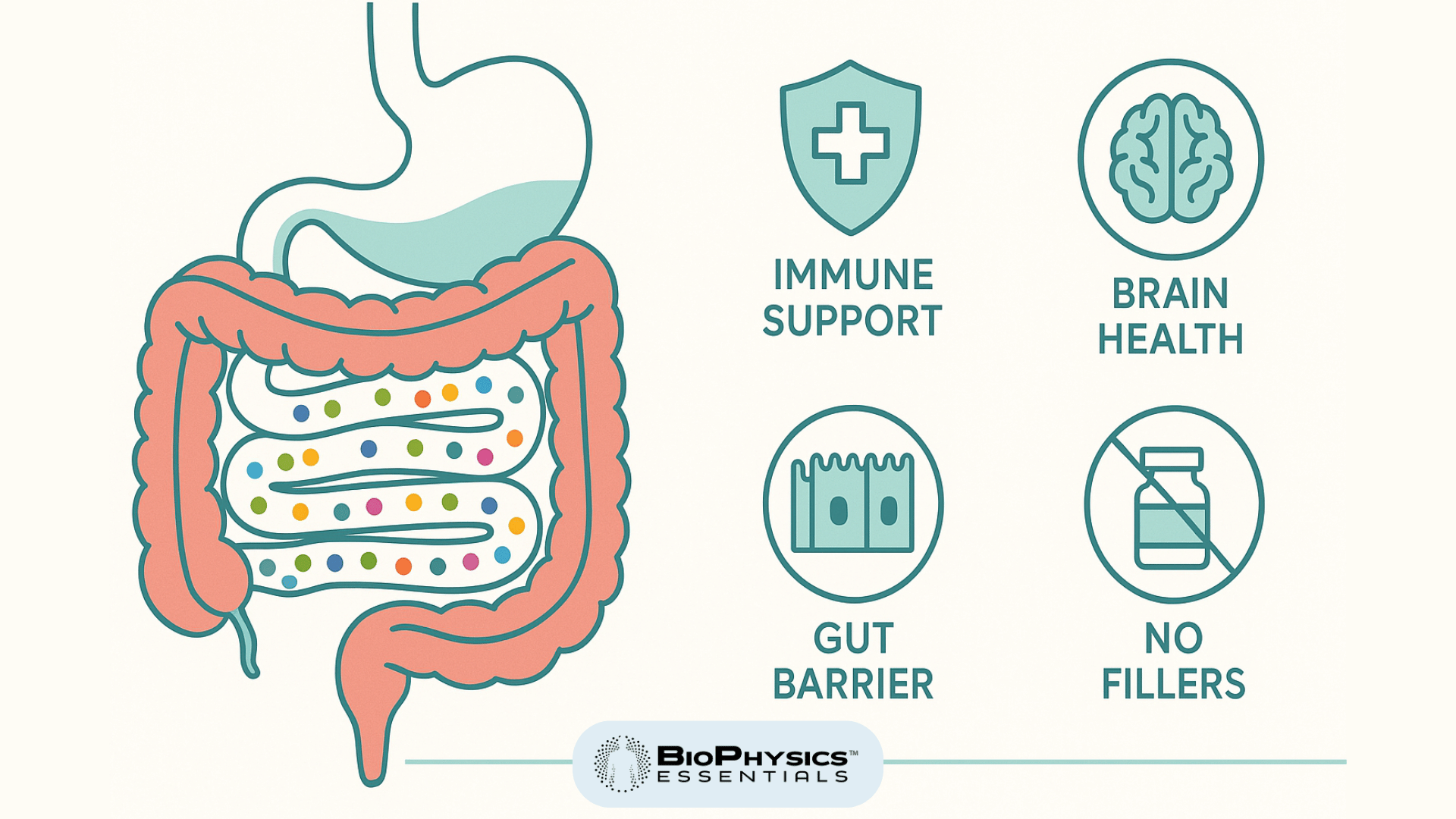


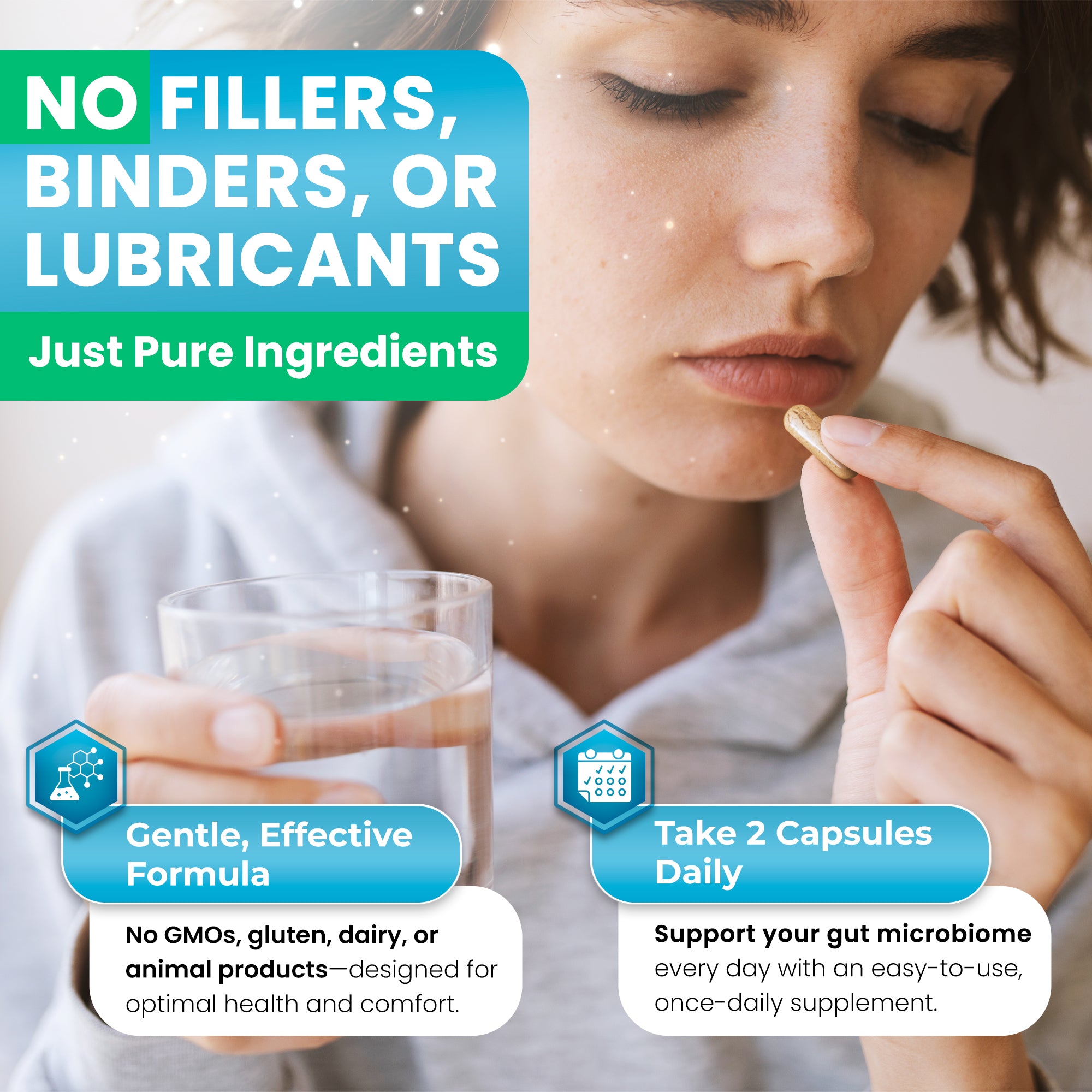
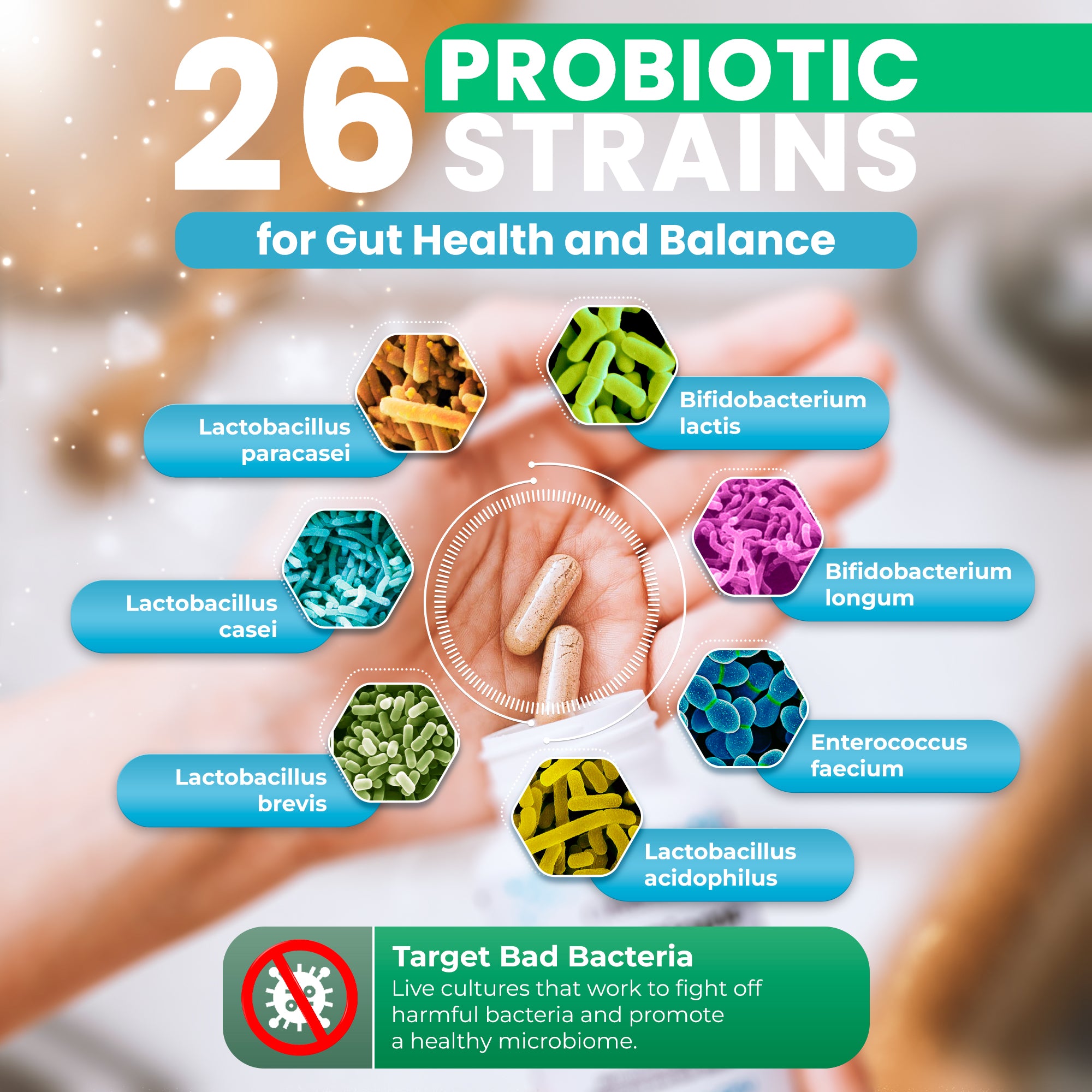
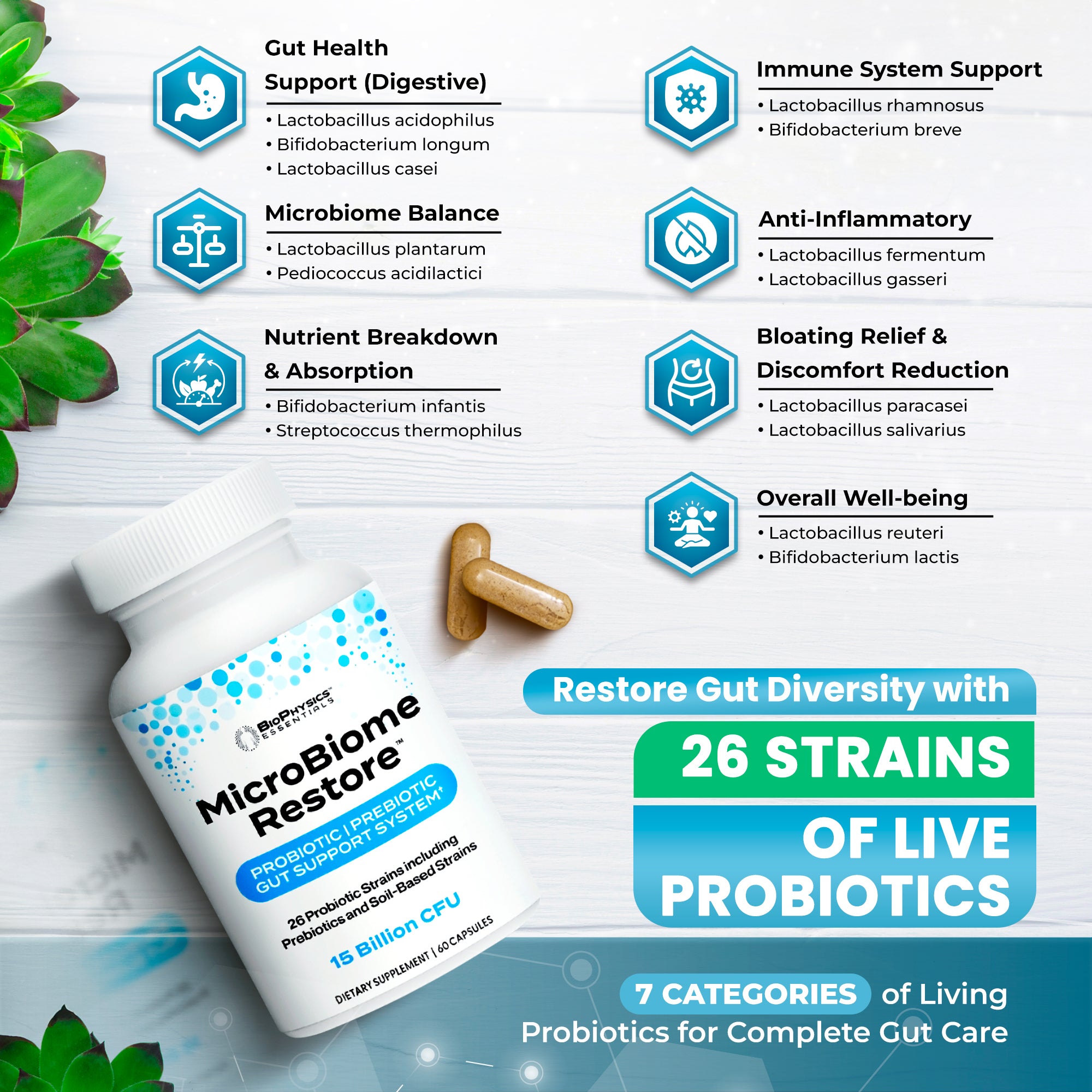
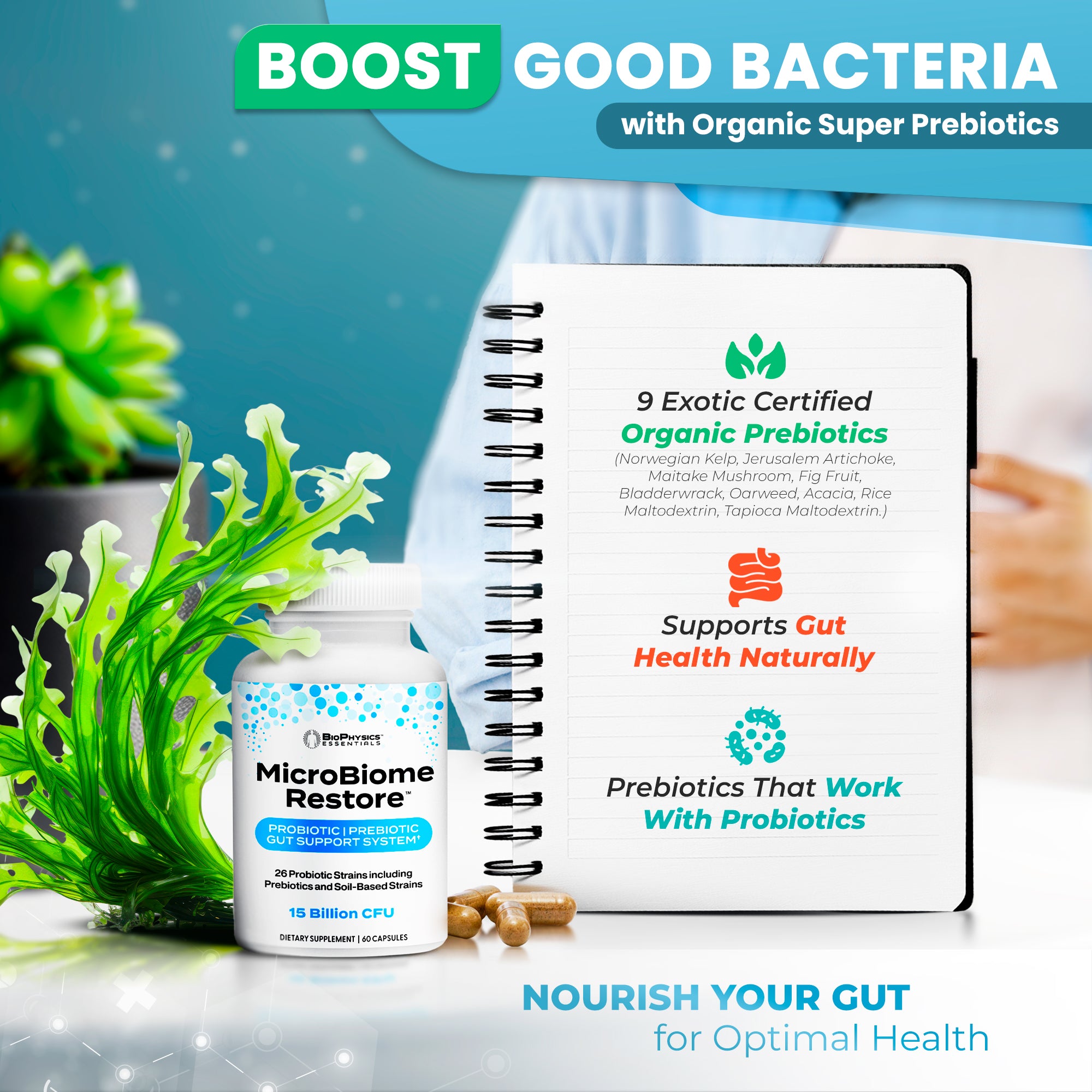
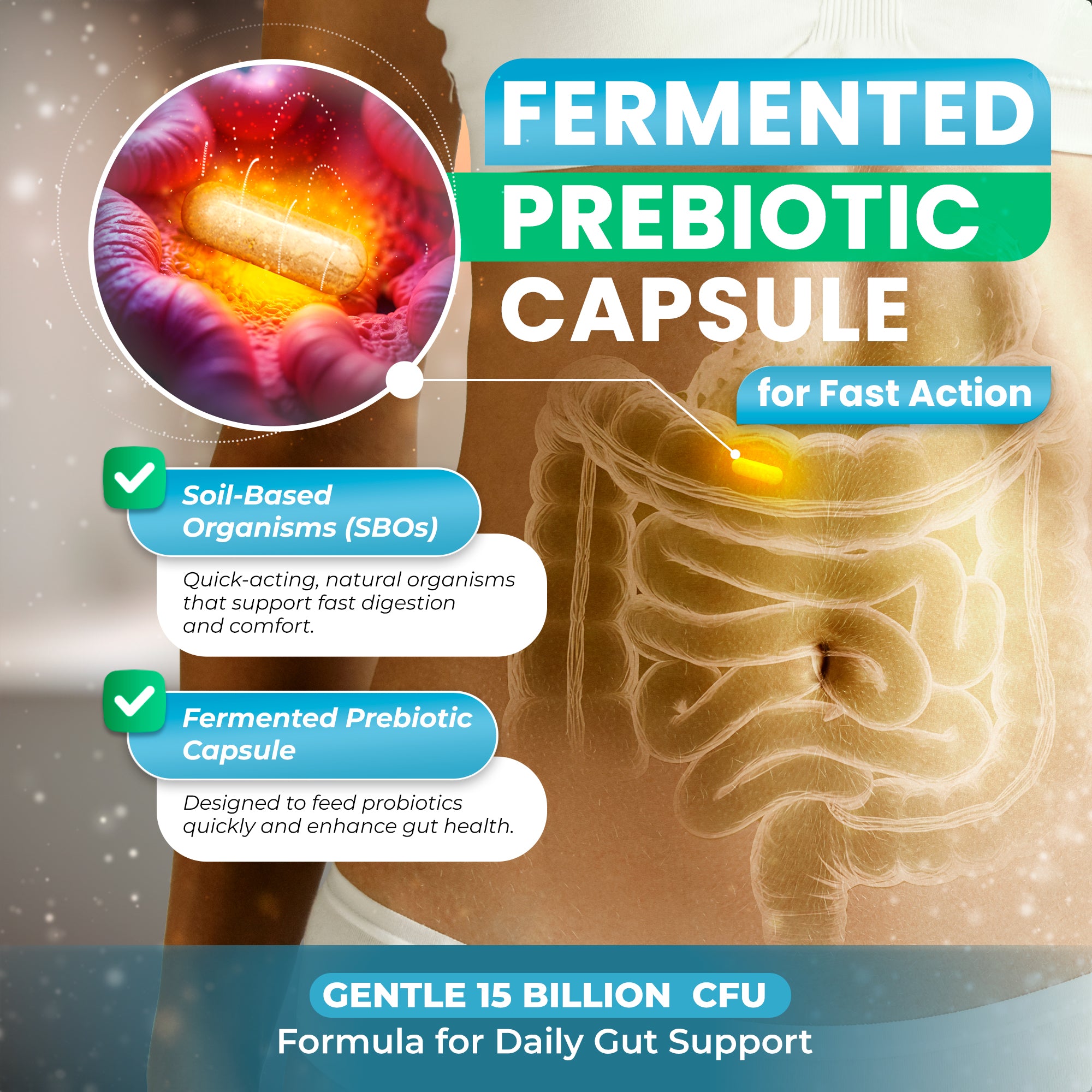


Share and get 15% off!
Simply share this product on one of the following social networks and you will unlock 15% off!